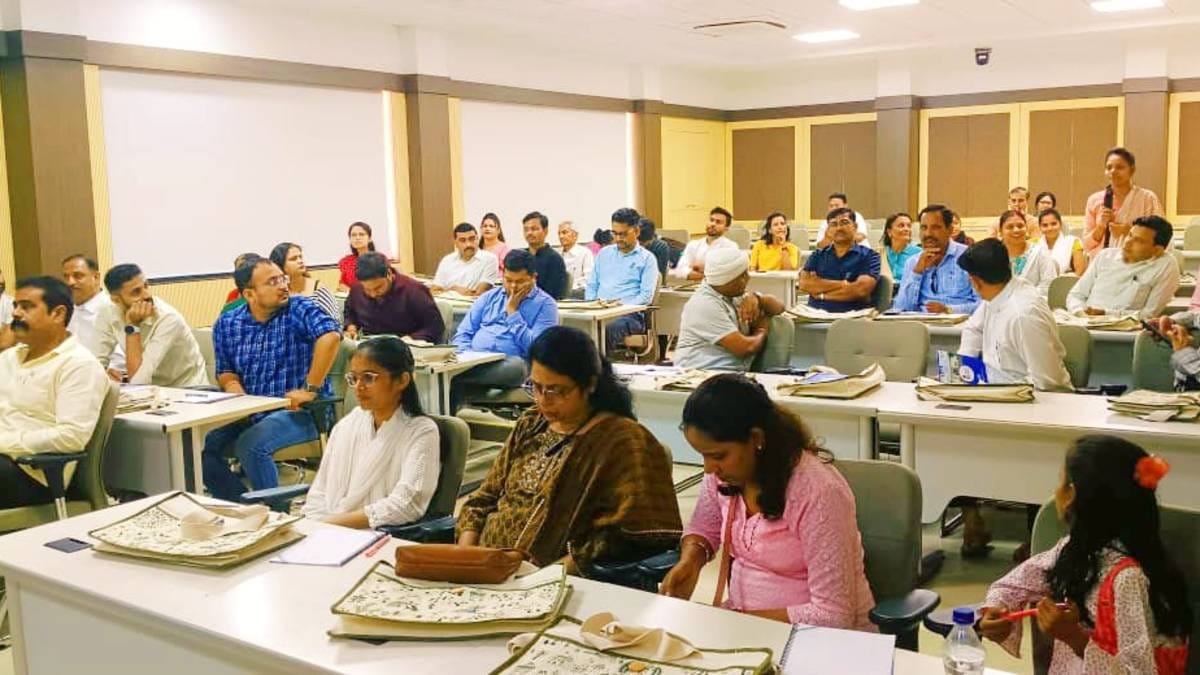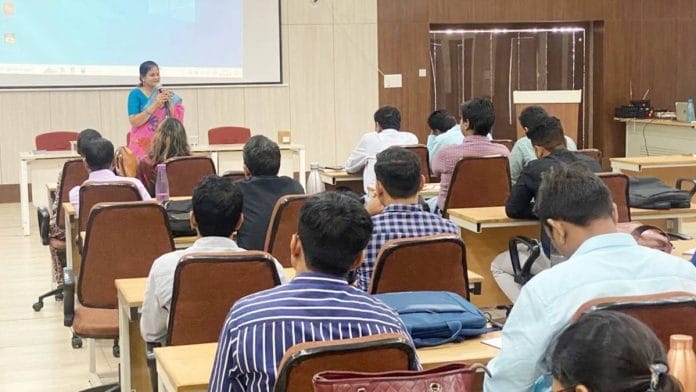Bhopal: Madhya Pradesh will soon have model “villages of happiness” or “Anandgrams” across the state. In a novel effort to shift focus from material progress to emotional well-being, the state is gearing up to teach the art of happiness, self-reflection and inner peace to its residents and develop one Anandgram in each of its 55 districts.
The initiative is being launched under the state government’s Anand Vibhag or happiness department that was formed in 2016.
Speaking to ThePrint, director of the happiness department and programme in-charge Satya Prakash Arya said that the initiative is based on the understanding that an individual finds happiness when he/she is closest to their value system.
“We are aiming to train individuals to delve into the thought process behind knowing oneself. This is at the core of this programme: to identify who they truly are. If I can understand my feelings and feel gratitude, it will replace my ego. When an individual realises this, self-transformation is a byproduct,” he explained.
Under the programme, one village in each state district will be chosen, in consultation with the zilla panchayat head, for development as an Anandgram. In the chosen village, one-day training will be imparted to 60 individuals that will include exercises of reflection.
One will be tasked to reflect on personal choices, relationships with family members, the society and nature at large, and then write down their thoughts. The purpose is to identify sources of happiness and feel gratitude so that one can live a content life, according to Arya.
“Under the Anandgram initiative, the first group for training at the village level will include ASHA or community health workers, anganwadi workers, school teachers and sarpanches along with volunteers. These people are the ones who go door-to-door and are in contact with almost all villagers. If they can be equipped with the right tools to identify and feel happiness, they can carry forward these teachings,” Arya said.
After the day’s training, shortlisted individuals will be further trained for three days in capital Bhopal. The first one-day session is set to be held in Khandwa Tuesday.
Ganesh Kanade, the trainer who will hold the session, told ThePrint that he uses his personal experiences to drive home the point of the exercises aimed at addressing various facets of life.
These are titled “Mere Rishte”, in which participants will reflect on their ties with family members as well as society, “Zindagi kaa lekha jokha”, in which they will write down instances where they were helped by people and when they helped others, and “freedom glass”, aimed at quiet reflection of one’s own actions.
“I witnessed certain incidents in my district, which had developed my perception of a community in a particular way. But as I underwent this programme, I questioned myself, and realised a single individual or a group of individuals cannot be a reflection of the entire community,” he said, adding that this realisation helped him improve relations with people around him.
Opening up on his own life, he reflected on his strained marriage and relations with his family. “Mine was an arranged marriage and my equation with my wife was strained, but when I realised that I need to make more effort, things are smoother,” Ganesh told ThePrint.

Sameera Naim, a teacher with the state’s higher education department who has been working with the Anand Vibhag since 2016, had her own reflections.
“I have always felt I have an impeccable record when it comes to integrity and honesty, but upon close reflection, there are so many things that we take for granted. We also cut corners at work and give ourselves this label of being honest and upright,” she said.
While launching programmes under its happiness department, Madhya Pradesh is also working to develop the state’s “happiness index”, assessing residents on inner happiness, family bonding and relationships.
Also Read: Madhya Pradesh CM orders action against Ashoknagar top cop over viral video of woman’s abuse
Dawn of realisation
The Anand Vibhag in Madhya Pradesh was incepted in 2016, following the Ujjain Simhastha, a religious mela.
According to Arya, during a discussion among seers and learned individuals at the mela, it came to light that Madhya Pradesh had made progress in developing physical infrastructure, agriculture, strengthening of the road network, and so on, but alongside these, there was a steep increase in crimes against women, corruption and people committing suicide.
The then chief minister Shivraj Singh Chouhan had subsequently tasked chief secretary Iqbal Singh Bains to look at the formulation of a happiness department. A committee with 21 governing members, including personalities like actor Anupam Kher, administrator of Dharmasthala Temple Veerendra Heggade, and Dr Pranav Pandya, head of the spiritual organisation All World Gayatri Pariwar, was then formed under the department and was instrumental in formulating the programmes that are now under implementation.
Speaking to ThePrint, an official working with the happiness department said: “We are not saying that money is not important, but the idea is to allow individuals to understand what is the purpose behind their wants.”
The Anandgram programme is part of the happiness department’s broader ‘Alpviram’ initiative, which prods individuals to pause and reflect on their inner voice to promote positive thinking. IAS officers in Ujjain will be part of a three-day Alpviram workshop in mid-May.
When it was pointed out that the workshops being held under the happiness department appeared to be similar to initiatives undertaken by the Art of Living Foundation or similar bodies, Naim said that there was a distinction.
“I have completed training under both Art of Living and Isha Foundation, but unlike Art of Living, where the focus is on meditation and breathing exercises, our programmes involve use of pen and paper, with audiences asked to quietly reflect on and record their thoughts on paper,” she said.
‘Identifying’ happiness
Students in Madhya Pradesh schools are also studying happiness as a subject following approval of the National Education Policy (NEP) in 2020.
Happiness is part of the curriculum for classes 9 to 12 and it would help a student reason three things: what I want to become, what I want to have or acquire, and what will I become once I achieve it?
Arya told ThePrint: “When a student enters class 9, they are on the edge of taking decisions that would decide their career. We have introduced subjects in class 9 to allow students to understand what they truly want from life and what are the ways that can help achieve it. This thought is further explored as the student appears for the board exams and then during higher secondary studies.”
Teachers across the state would be given training on how to help students identify what would give them real happiness in life.
The Madhya Pradesh happiness department looked at the course on “happiness and fulfilment” being taught at Hyderabad-based Indian School of Business, and adopted its six-week video programme which was translated in Hindi, government sources said.
Additionally, the need to develop own happiness index, focusing on principles of inner happiness and relationships, was felt after the state authorities felt that the western happiness indices, with their emphasis on physical aspects to analyse happiness, were not suitable in the Indian context.
Moving away from a happiness analysis involving parameters, such as GDP, generosity, health, social support, freedom to make life choices and perception of corruption, among other thing, the Madhya Pradesh happiness index will lay emphasis on non-materialistic elements, including relationship with oneself, family bonds and relationship with society.
According to sources, happiness in Madhya Pradesh will be analysed on the basis of Aahar (what we consume), vihar (daily routine), shram (labour) and vyavhar (behaviour).
A questionnaire for a survey among residents has been developed following consultation with representatives from Canada, US and Bhutan, among others, and is set to be finalised.
The happiness department plans to rope in the Indian Institute of Technology in Kharagpur to help analyse the findings of the survey, and the state’s happiness index is likely to be published by the end of this year, the sources said.
(Edited by Nida Fatima Siddiqui)
Also Read: 7 women lured using ‘Magic App’ & raped — police in MP’s Sidhi uncover racket, arrest 4






